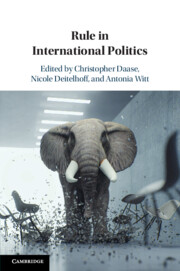Book contents
- Rule in International Politics
- Rule in International Politics
- Copyright page
- Contents
- Contributors
- Acknowledgements
- Introduction
- Part I Theorizing Rule
- 2 Authority in International Relations
- 3 Ruling the World
- 4 Anarchy, Authority, Rule: Reconsidered
- Part II Practicing Rule
- Part III Resisting Rule
- Index
- References
2 - Authority in International Relations
Contracted, Inscribed, or Reflexive?
from Part I - Theorizing Rule
Published online by Cambridge University Press: 15 June 2023
- Rule in International Politics
- Rule in International Politics
- Copyright page
- Contents
- Contributors
- Acknowledgements
- Introduction
- Part I Theorizing Rule
- 2 Authority in International Relations
- 3 Ruling the World
- 4 Anarchy, Authority, Rule: Reconsidered
- Part II Practicing Rule
- Part III Resisting Rule
- Index
- References
Summary
In this chapter, authority and rule are considered as analytical concepts to capture different forms of domination based on recognition. Both concepts involve the social paradox of voluntary subordination, particularly evident concerning global governance and International Organizations (IOs). The chapter discusses three theoretical solutions to the social paradox, thus three conceptualizations of authority. While contracted authority and inscribed authority represent the dominant conceptions in IR, they suffer from several shortcomings. Building on a critique of these variants, the chapter introduces reflexive authority as a third response, which understands authority in global governance as deriving from epistemic foundations that include the permanent monitoring of authorities. Reflexive authority relations involve enlightened and critical subordinates recognizing authority because they acknowledge their limitations. Instead of commands, authority holders send requests to constituencies, who monitor the authorities closely. This recognition of authority as worth observing leads to deference. Primary forms of contestations include non-compliance, delegitimation, and dissidence, which aim at different targets.
Keywords
- Type
- Chapter
- Information
- Rule in International Politics , pp. 33 - 60Publisher: Cambridge University PressPrint publication year: 2023
References
- 1
- Cited by

